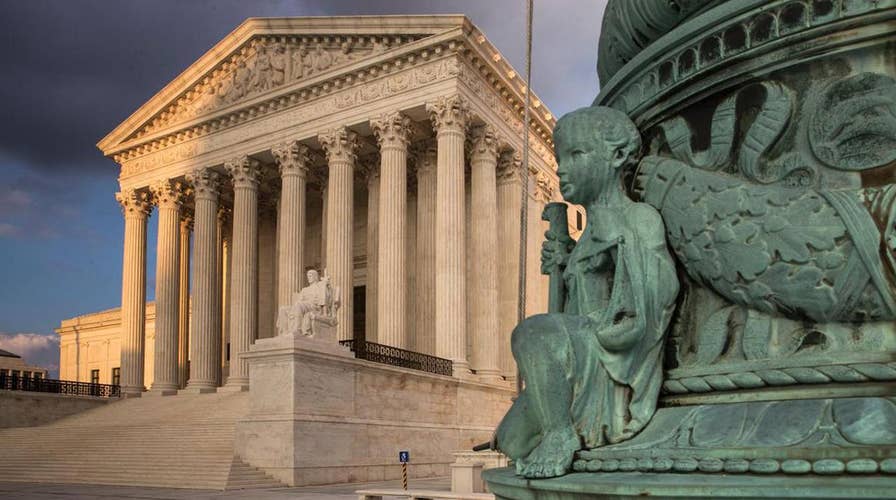Supreme Court to hear oral arguments on travel ban case
Supreme Court to hear arguments regarding whether or not Trump's travel ban discriminates based on nationality or religion; legal panel provides insight.
When Alexander Hamilton wrote of the judiciary, in Federalist 78, he called it the “least dangerous branch.” It lacks the executive power of the sword and Congress’ power of the purse. It has only the faculty of judgment, and must depend on the executive to enforce its judgments.
But what if the judges mistrust the executive, and announce that his orders be ignored? In that case the entire system of separation of powers might be undone, in matters purely political. The judiciary will have usurped the executive power and made little presidents of themselves. A frightening thought, and yet that is where we seem to be headed.
The threat began with the practice, begun over a year ago, of federal District Court judges announcing that Trump’s travel bans were unconstitutional. It wasn’t that presidents lack the authority to manage immigration policies. That wasn’t in question. Rather, it was the authority of this president that was impugned. Trump was poison, and his directives were the fruit of a poisoned tree. He had shown himself to be biased against radical Islam, and as a consequence was deprived of any constitutional authority over immigration from Muslim countries. As the Fourth Circuit Court of Appeals put it, Trump’s tweets showed that he was “tainted with animus toward Islam.”
There have been a series of such decisions, from District judges cherry-picked as Trump haters. And they did more than impugn Trump’s authority in their judicial District. They went beyond this to issue a countrywide injunction, a single judge ruling over the United States as a whole.
The issue is now before the Supreme Court. After initial judicial rebuffs, Trump is now on the third iteration of his travel ban. The Court will hear an appeal of a District Court decision in Hawaii, affirmed by the Ninth Circuit, that the ban revealed Trump’s hostility to Muslims. “For over a year, the president campaigned on the pledge, never retracted, that he would ban Muslims from entering the United States.”
The Dems have run out of evidence of collusion, and merely want to keep the issue on life support. And the remedy? If the election was tainted, why not a do-over? Why not an injunction setting aside an election?
Had the president’s statements been taken in context, it would have been clear that Trump was addressing the problem of radical Islamic jihadists, and that he elsewhere went out of his way to condemn all racial and religious prejudices. But a politically minded judiciary wasn’t interested in context. What they sought was political power, the power to nullify the decisions of a president they despise.
And why stop there? If everything Trump does is tainted with racial or religious bias, as the Democrats tell us, then it’s hard to see any limit to the scope of the judicial branch’s power in the age of Donald Trump. If so, what seemed like an idiotic lawsuit by the Democratic Party against the Republicans, for collusion with the Russians in the 2016 election, might in fact be a very astute move. The Dems have run out of evidence of collusion, and merely want to keep the issue on life support. And the remedy? If the election was tainted, why not a do-over? Why not an injunction setting aside an election? For Heaven’s sake, think of the money we’d save if we didn’t need to have elections, but could rely on our betters on the bench to decide things for us.
In his book, “The Least Dangerous Branch,” Yale scholar Alexander Bickel saw the dangers of a runaway judicial power. He called it “the counter-majoritarian difficulty.” When judges usurp political power, it’s not simply a contest between two branches of the federal government. It’s also a contest between democratic and non-democratic government, between rule by elected officials and rule by a priestly class of judges.
The fate of the latest Trump travel ban is now before the Supreme Court. One expects that they’ll uphold it. The ban is well-tailored to protect Americans against terrorism, and resembles other bans from other presidents. Moreover, the Supreme Court might reasonably hesitate before provoking a constitutional crisis. For if we permit courts to intrude on political decisions, we invite presidents to second-guess judicial decisions. We’ve seen this before, after all. Trump has been compared to Andrew Jackson, who said that Chief Justice “John Marshall has made his decision; now let him enforce it.”





















